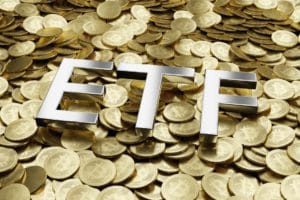The Receipts Depositary Corporation (RDC), with the support of Franklin Templeton, plans to release Bitcoin-based deposit receipts (DR BTC) in the coming weeks, exempt from SEC registration.
Let’s see below all the details.
The DRC regarding speculation on the SEC’s Bitcoin ETFs
Amidst the rumors about the possible approval by the Securities and Exchange Commission (SEC) of Bitcoin spot exchange-traded funds (ETFs) in the United States, the Receipts Depositary Corporation (RDC), supported by Franklin Templeton, brings important news.
In fact, the RDC has announced the intention to launch a security product based on Bitcoin, exempt from registration with the SEC.
The company states that deposit receipts will be exempt for qualified institutional buyers under the U.S. Securities Act of 1933.
It also plans to issue the first BTC DR with a 1.66% increase to these investors in the coming weeks.
Institutional qualified buyers, financially sophisticated entities such as banks and investment companies, with significant assets, are able to trade securities that may not be registered with the SEC.
RDC, with the support of BTIG and Broadhaven Ventures, emphasizes that DR BTC will follow the same structure as American Depositary Receipts (ADR).
Which represent foreign company stocks issued by banks. ADRs are traded on US stock exchanges in US dollars, simplifying the process of buying and selling shares of foreign companies for American investors.
Ankit Mehta, co-founder and CEO of RDC, enthusiastically comments:
“We are pleased to offer qualified institutional buyers secure and regulated access to the digital assets they have been waiting for through BTC DR. There are numerous advantages to using deposit certificates, including their proven structure that offers direct ownership of the underlying asset and easy integration into institutional products. BTC DRs are universally fungible, as QIBs can convert their bitcoin holdings into DRs and vice versa.”
Broadridge and Anchorage Digital collaborate for an exciting launch of DR Bitcoin
For the launch of DR Bitcoin, we see that Broadridge Corporate Issuer Solutions operates as a registered transfer agent with the SEC for RDC.
At the same time, the federally recognized digital asset bank, Anchorage Digital, will provide custody with a remote structure in case of failure.
This initiative aims to mitigate counterparty credit risk by the issuing depository, guaranteeing full 100% support from Bitcoin held in custody for the DR.
The company emphasizes that such tokens cannot be loaned, rehypothecated, or pledged.
The BTC DRs operate within the infrastructure of the regulated market of the United States, cleared through The Depository Trust Company.
This allows qualified investors to own Bitcoin using the same technology, workflows, and counterpart relationships they use for traditional securities, according to RDC.
Diogo Mónica, president and co-founder of Anchorage Digital, praised the RDC team, emphasizing that the institutional-grade custody at Anchorage Digital Bank will ensure the security of the underlying BTC.
Mónica expresses enthusiasm in contributing to introducing Bitcoin into the securities ecosystem.
Although BTC DRs are the first RDC offering, the company claims to be ready to create suitable securities for other alternative assets as well.
The clash between Charles Hoskinson and Peter Schiff: reflections on the Bitcoin ETF
The cryptocurrency community has recently witnessed a heated exchange of opinions between two prominent figures: Charles Hoskinson, co-founder of Cardano, and Peter Schiff, a well-known gold investor and critic of Bitcoin.
The recent statements by Schiff about the potential effect of a Bitcoin ETF listed in the United States have sparked criticism and jokes, especially from Hoskinson and the crypto community.
Schiff had initially warned against the enthusiasm surrounding the expected Bitcoin ETFs, suggesting that their actual introduction may not lead to the anticipated wave of investment in the price of Bitcoin.
He also pointed out that Bitcoin ETFs could be useless, as individuals can directly own Bitcoin without the costs associated with ETFs, comparing it to owning gold ETFs.
In response, Hoskinson drew attention to Schiff’s early skepticism towards Bitcoin this year, highlighting a broader criticism from the crypto community towards Schiff’s long-standing opinions on Bitcoin.
A critical analysis of Schiff’s thesis highlights several points to consider.
First of all, his skepticism about the demand for Bitcoin ETFs could overlook market dynamics, as institutional investors often seek regulated vehicles like ETFs to expose themselves to cryptocurrencies.
The introduction of a Bitcoin ETF could indeed facilitate access to this asset class for investors.
Furthermore, Schiff’s comparison between Bitcoin and gold ETFs oversimplifies the unique value propositions of each asset. The digital and decentralized nature of Bitcoin offers different advantages and risks compared to gold.
Directly owning Bitcoin, as Schiff suggests, presents challenges such as risks for security and technical complexity.


